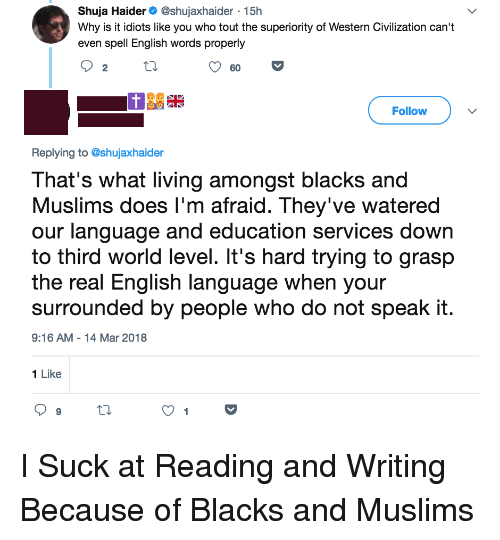Critical Analysis Essay
Abstract
In this essay I analyzed an interview with Sarah Palin on the topic of minorities in America. How language discrimination can extend very easily to race and who has the power to fix these views.
Language Myths and People in Power

More than 20% of U.S. residents speak a language other than English in their homes, one in 5, and one in 10 of them have that language as Spanish. While that may seem like a lot, when compared to a staggering 56% bilingual residents in Europe, it’s concerning. This is because of the lack in education to kids who speak a different language in the house. If the numbers where added up accordingly by students in the system, the budget for bilingual education should be around 12 billion. However, we know this is not the reality, many of these kids in need of extra assistance are being left behind. Being able to communicate effectively in two or more languages is something that should be supported and encouraged by all, especially those with the platforms to make these changes.
Which is why it was surprising to hear what Sarah Palin, former Alaskan governor, said in her interview with CNN when asked about candidate Jeb Bush and his bilingual status. She responds by saying that it is good for Jeb Bush to be able to communicate with this large population of Spanish speakers that he “shares a connection” with. However, she goes on to say that despite this, these people should learn to speak “American” if they want to stay in America, borderline threatening them, regardless of the fact that America has no official language. To justify her view, she also mentions how knowing the same language is a “Unifying aspect of a Nation” and is important to have.
The language myth I believe is being portrayed in this example is the idea that in a certain country only a certain language should be spoken. This prospect is explained thoroughly by Lippi-Green in her text “Accent, standard language ideology, and discriminatory pretext in the courts”, she talks about the perceived superiority there exists in the U.S. of the English language. Lippi-Green states that “LTF discrimination stems primarily from the acceptance of a standard language ideology . . . a bias toward an abstracted, idealized, homogenous spoken language which is imposed from above. . .”. All while arguing that this all comes from places like the entertainment industry, the educational system, the news and even the judicial court. Places the common people can’t reach, or have a voice in. Things we interact with every day that are influencing not only us unknowingly but also our children. And now even people in power like Sarah Palin, are sharing in these closed-minded views.
I understand where she is coming from, however. If we keep placing these labels on ourselves like “black English” and “standard English” or Spanish vs. English, we only serve to separating ourselves form each other. By accepting these differences in language, we open ourselves up to more possibilities instead of limiting ourselves to just one. Despite this what I don’t agree on with her is that it is on the speakers to change this ideology. It is up to those who impose these attitudes on the public to change their way of thinking. As Young states in his response to Fish titled “Should Writers Use They Own English” where he says “As Laura Greenfield point out in her chapter on racism and writing pedagogy in this collection, it’s ATTITUDES. It be the way folks with some power perceive other peoples language.” This bias and discrimination was put in place by people like Palin that have the ability to influence others greatly and in a wide scale.

In this visual the main character was responding to a tweet on how their English is bad and they can’t spell correctly. They counter this by putting the blame on Blacks and Muslims in their community that they believe do not speak English correctly, and accusing them of watering down their language and education. This relates to the language myth because this person believes that people not being able to speak English is a bad thing and is proving detrimental to society. They believe in the “superiority of Western Civilization”, especially in its language. However, we know that being bilingual is a priceless advantage both in daily life and in the workplace. The education system hasn’t been “watered down” but rather enhanced by these languages that have been included in an otherwise limited curriculum. By teaching kids, a second language we open doors for them that will eventually help them later in life. But also, to encourage those who speak a different language and support them, so they are ready for society. Many bilingual kids feel a sense of inferiority because of their abilities in English or lack thereof. Teaching them to be proud of their multilingualism is important.
Which is why it is up to these influential people to use their platforms wisely to stop language discrimination and standard English superiority. If left up to the speakers, nothing would get done. We should teach kids from early on that language diversity is a good thing and to embrace those who speak differently from themselves.

